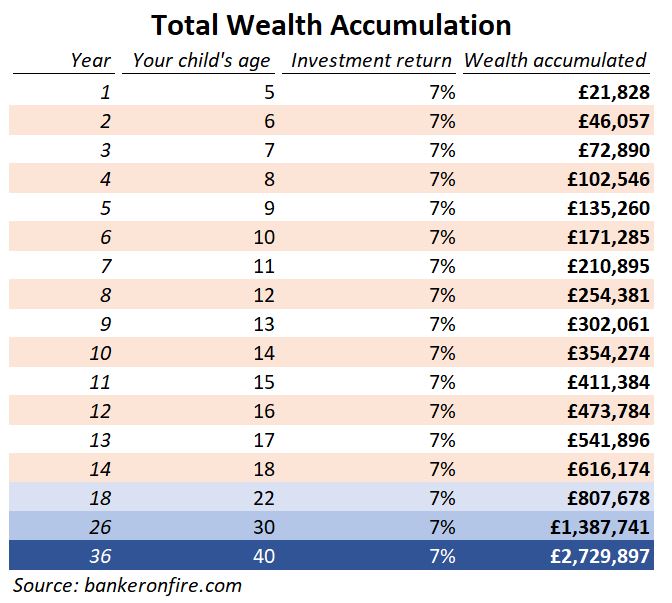Personal finance can feel pretty overwhelming at times.
This is especially true for those who are just starting out. Objectively speaking, there’s quite a bit to wrap your head around before you start feeling like you are making progress.
It can also apply to those who have been on the journey for a long time, especially during periods of market volatility like the one we are experiencing today.
Here’s the interesting bit, though:
When it comes to your finances, long-term success usually boils down to just a few BIG decisions.
Get them right, and you are pretty much set for life. It may take some time, but you are simply bound to make it.
But screw more than a couple up, and things change rather dramatically. You can still win the game – but you’ll be fighting an uphill battle for years, if not decades.
So how do you cut through the noise and focus on the stuff that really moves the needle?
In today’s post, I am going to explore the five most important money decisions you will have to make in your life.
Pay attention now – and save yourself a ton of heartache (and time) later.

Let’s dive in.
Money Decision #1: Choosing A Profession
Whether you like it or not, work will form one of the most important cornerstones of your life.
It will allow you to earn a living, master a craft (or a couple), achieve self-actualization, and build lasting professional and personal relationships.
Contrary to what most people seem to think, achieving FIRE is not the holy grail. In fact, the very pursuit of FIRE is actually a highly punitive affair.
Instead, the ultimate financial hack is choosing a profession that you enjoy, one that pays reasonably well, and offers a path to a good work-life balance.
You are MUCH better off pursuing a long and rewarding career in a field you love well into your 60s than trying to escape a job you hate at 45.
Now, you may argue that finding a career that ticks all the boxes above is easier said than done. But the good news is that you don’t need to hit all three criteria (enjoyment, pay, work-life balance) right away.
In your 20s and 30s, you’ve got plenty of time and energy to work long hours even if the pay isn’t immediately compelling.
As a matter of fact, there are many fields (medicine and investment banking are good examples) where this “trial by fire” is pretty much a pre-requisite.
However, you absolutely want a career that offers a clear path to reasonable pay and balance once you’ve put the initial effort in. To give you an example, I have always been inspired by this dentist who clears seven figures a year while only working 32 hours a week.
And while it’s best to get it right from the start, it’s almost never too late to change your path.
Sure, you won’t enjoy the professional equivalent of compounding over multiple decades. But I do know many people in their 40s and even 50s who repositioned themselves for a successful and enjoyable second act.
The final point to make here is to do whatever you can to minimize your student debt.
Yes, you will likely need to make an investment of money and time in order to get the right educational credentials.
But please don’t get carried away, ending up with so much debt that it crushes you like a ton of bricks for the next couple of decades.
Money Decision #2: Choosing A Spouse
Some people believe in eternal love. Others consider love to be a hormonal imbalance that normalizes over time.
The jury may still be out on this one, but what is abundantly clear is that disagreements over money are one of the leading causes of divorce in life.
And if there’s one thing you want to avoid in life (if you can), it’s going through a divorce.
So choose carefully. Observe your partner’s money habits and behaviours. Have the uncomfortable conversations early on.
Plan your future together. Where do you want to live? How many kids to have (if any)?
What does the “dream life” look like to each of you?
You don’t need to become one of those people who just can’t commit. Equally, you are talking about forming a partnership that could last for 50+ years.
Do the hard work upfront – and enjoy the benefits for a lifetime.
Money Decision #3: Choosing Where To Live
As someone who has moved countries three times (and is gearing up for another move), this is a topic I know inside out.
On one hand, staying mobile and moving around can be a fantastic way to supercharge your career ascent. All of our family’s moves have paid off in spades, making the logistical headaches totally worth it.
But there are costs to bear that go way beyond the price of moving your belongings from one city to another.
You lose the network and the relationships you’ve built up. The move will probably disrupt your spouse’s career trajectory. If you have kids, you’ve got to consider the impact on their education, and so forth.
Most importantly, if you keep renting all the time moving actually can prevent you from building up that valuable home equity – which conveniently segways into my next point:
Own your house.
Yes, there are some vocal proponents of renting as opposed to buying out there. I will also acknowledge that in some cases, you might come out ahead financially by renting.
But for the vast majority of people out there, owning their house is a cheat code to building wealth.
Financially, it’s like a leveraged buyout for the ordinary Joe – but there are non-financial benefits, too.
As you get older (and especially if you have kids), you will appreciate having your own place instead of having to move every couple of years because your landlord had a change of plans.
There’s also something to be said about being able to do the place up exactly as you wish instead of contorting around someone else’s design ideas.
My final piece of advice here is to avoid living in high-cost locations. I’ve lived in both New York and London, and they are exceptional places full of career and personal opportunities.
But raising a family in a place like that changes the calculus entirely.
Yes, moving to a low or a medium-cost location might involve a pay cut. But once you consider the associated reduction in costs, you will probably come out ahead.
And you might even enjoy a better work-life balance vs the always-on culture of big financial centers.
Money Decision #4: Children
Speaking as a father of two, I can tell you that having children is one of the most rewarding experiences in life.
But I will also tell you that it is one of the most intense things you will ever go through – physically, psychologically, and yes, financially.
Here are a few aspects you need to consider – and talk through with your spouse early on (see #2 above).
Will you have children in the first place?
For many people, the preferred answer is an emphatic “yes” – but it’s also perfectly fine to go the other direction.
As a matter of fact, if you are not 100% confident you want children, you probably shouldn’t.
You will avoid a lifelong commitment you’re not ready for – and a whole bunch of expenses to boot.
How many children will you have?
To state the obvious, raising three kids takes a LOT more effort and money than raising one. You need to carefully consider the trade-offs in terms of career sacrifices, support (family and external) required, living arrangements, and so forth.
Then there’s the timing aspect. If you only want to have one kid, you can probably wait until your late 30s and possibly early 40s.
But if you are aiming for three or more, you may want to get an earlier start.
When will you have children?
Children will make far less of a dent in your finances if you have already built up a proper nest egg by the time you have them.
You also need to consider your career prospects. Sadly, having kids too early can (and often does) derail a promising career, especially for women.
From that perspective, it makes sense to wait until you’ve got proper career momentum.
Perhaps you wait until you clear that big promotion hurdle.
Alternatively, you may want to hold off until you’ve built up a solid reputation in the industry or have a proper mentor network that can help sustain your trajectory while you go through the early childrearing years.
But the most important aspect is not to leave it too late. Prioritizing your finances and careers is fine for a while, but your biological clock might run out quicker than you think.
Will the kids go to private school?
Sending your kids to a private school might well turn out to be the biggest money decision of your life.
I’ve previously written about the true cost of private schools as well as our experience with private education for our daughter.
There are no right or wrong decisions here. But if you do choose to go the private route, make sure you are fully aware of the opportunity cost:
Money Decision #5: Choosing To Invest
The first four decisions are designed to ensure you maximize the amount of money available for investing.
But you will never get wealthy unless you actually put that money to work.
We talk about investing day in and day out on this blog, and there’s more to it than I can fit in a single post.
I will, however, make one critical point.
You see, investing is a funny game.
Sure, it matters HOW MUCH you invest.
But what matters much, much more is HOW EARLY you start investing.
As a matter of fact:
In investing, doing the right thing between 20 and 30 years of age means you don't really need to do anything else ever againhttps://t.co/zE16VrPwEx pic.twitter.com/5iPQkpPkfp
— Banker OnFIRE (@bankeronfire) May 13, 2022
One of the best money decisions you can make is to have a long, hard look at the pie chart above.
I have once called it the most important chart in investing, and I stand by those words.
And then, just get on with it.
As always, thank you for reading – and good luck on your journey!
About Banker On Fire
Enjoyed this post?
Then you may want to sign up for our exclusive updates, delivered straight to your inbox.
You can also follow me on Twitter or Facebook, or share the post using the buttons above.
Banker On FIRE is an M&A (mergers and acquisitions) investment banker. I am passionate about capital markets, behavioural economics, financial independence, and living the best life possible.
Find out more about me and this blog here.
If you are new to investing, here is a good place to start.
For advertising opportunities, please send an email to bankeronfire at gmail dot com


Pingback: Weekend Reading: Two podcasts on the possible future - Monevator
Great article as usual. I’m a similar age and family situation to yourself, and although I agree with most points, i want to query sub-point in number 3 – ‘avoiding living in high-cost locations’.
In my experience, areas with high costs of living have more high earners, and house price inflation outstrips lower cost locations. Further, during a downturn well-heeled postcodes hold their value better because they are perceived as more desirable and high net worth’s are less dependent on mortgages. For example, historically London price appreciation has way outstripped the rest of UK, and also held-up better during the 2008 financial crash.
Knowing homeowners can refinance circa every 2 years (i.e. extract cash), why would a low cost location with lower house appreciation be better?
Further, considering mortgage borrowing is typically 4.5x salary, even a small London weighting could amplify returns?
Maybe these issues could form part of one of your future posts? I have long wondered if a more quantitative analysis could be done on this trade-off.
Cheers CD, all sensible points I think! Agree on price appreciation, though if you look at the houses around the Crossrail, apparently those went up quite a bit over the past 10 years as well.
Probably tough to do a quantitative analysis given the myriad of factors at play. Have got to also consider how much longer it will take to get on the housing ladder, whether you can actually afford a place in one of the better postcodes, etc etc etc